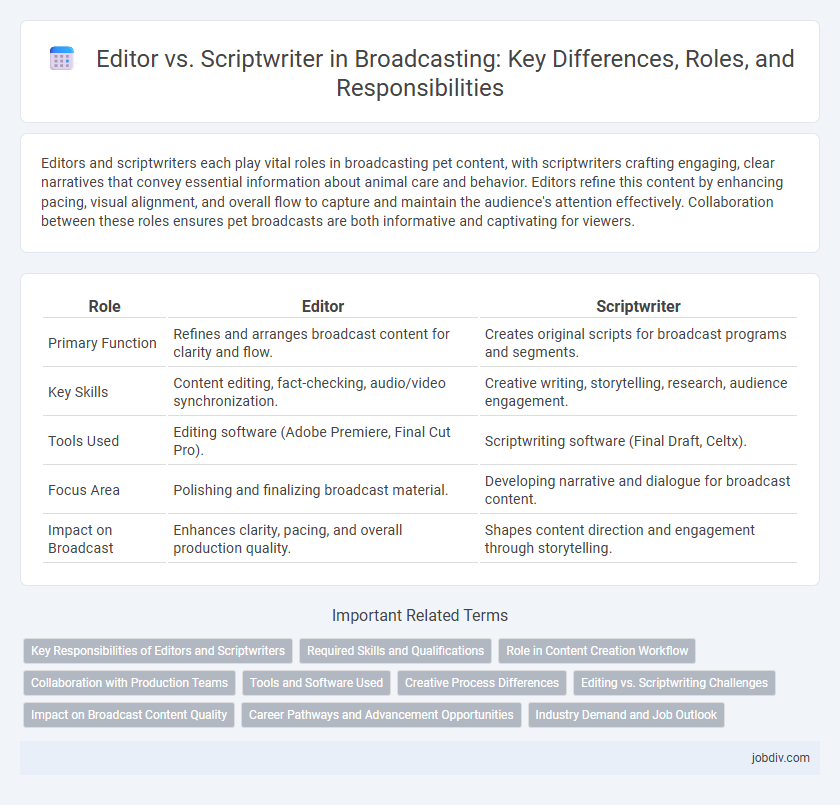Editors and scriptwriters each play vital roles in broadcasting pet content, with scriptwriters crafting engaging, clear narratives that convey essential information about animal care and behavior. Editors refine this content by enhancing pacing, visual alignment, and overall flow to capture and maintain the audience's attention effectively. Collaboration between these roles ensures pet broadcasts are both informative and captivating for viewers.
Table of Comparison
| Role | Editor | Scriptwriter |
|---|---|---|
| Primary Function | Refines and arranges broadcast content for clarity and flow. | Creates original scripts for broadcast programs and segments. |
| Key Skills | Content editing, fact-checking, audio/video synchronization. | Creative writing, storytelling, research, audience engagement. |
| Tools Used | Editing software (Adobe Premiere, Final Cut Pro). | Scriptwriting software (Final Draft, Celtx). |
| Focus Area | Polishing and finalizing broadcast material. | Developing narrative and dialogue for broadcast content. |
| Impact on Broadcast | Enhances clarity, pacing, and overall production quality. | Shapes content direction and engagement through storytelling. |
Key Responsibilities of Editors and Scriptwriters
Editors oversee the final quality of broadcast content, ensuring coherence, clarity, and technical precision by reviewing footage, audio, and visual effects. Scriptwriters develop compelling narratives and dialogue tailored to the target audience, crafting engaging and structured scripts that align with the show's theme and broadcast standards. Both roles are crucial in the production workflow, with editors refining and assembling content while scriptwriters focus on creative scripting and storytelling.
Required Skills and Qualifications
An editor in broadcasting must possess strong attention to detail, proficiency in video and audio editing software, and a deep understanding of storytelling techniques to ensure content clarity and flow. Scriptwriters require excellent creative writing skills, knowledge of audience engagement strategies, and the ability to craft concise, compelling narratives aligned with broadcasting standards. Both roles benefit from experience in media production, strong communication abilities, and familiarity with industry regulations.
Role in Content Creation Workflow
Editors refine and shape raw footage or audio to create a polished final product, ensuring continuity, pacing, and visual or auditory appeal. Scriptwriters develop the narrative framework by writing dialogue, scenes, and directions that guide the production team and talent. Their collaboration is essential in the content creation workflow, with scriptwriters setting the foundation and editors enhancing the storytelling through post-production techniques.
Collaboration with Production Teams
Editors and scriptwriters collaborate closely with production teams to ensure seamless content flow and coherence in broadcasting projects. Scriptwriters develop clear, engaging narratives that provide a solid foundation for production teams, while editors refine footage and audio to align with the script's intent and enhance storytelling. This collaboration optimizes visual and narrative consistency, improving the overall quality and impact of broadcast content.
Tools and Software Used
Editors primarily use software like Adobe Premiere Pro, Final Cut Pro, and Avid Media Composer for video editing, color correction, and sound integration, optimizing visual content for broadcasting. Scriptwriters rely on tools such as Final Draft, Celtx, and WriterDuet to develop scripts, manage story structure, and collaborate on dialogue and scene development tailored for broadcast formats. Both roles leverage digital asset management systems and cloud-based platforms like Frame.io to streamline workflow and ensure seamless content delivery.
Creative Process Differences
Editors refine and structure raw footage to ensure narrative coherence, pacing, and visual flow, emphasizing technical precision and continuity within the broadcasting timeline. Scriptwriters craft original dialogues, scene settings, and story arcs, focusing on narrative creativity and audience engagement through compelling content. The editor's process centers on post-production polish, while the scriptwriter drives pre-production conceptualization and storytelling innovation.
Editing vs. Scriptwriting Challenges
Editing demands meticulous attention to audio-visual synchronization, pacing, and continuity to create a seamless final product, often requiring advanced technical skills and creative decision-making under tight deadlines. Scriptwriting challenges center on crafting engaging narratives, developing clear dialogue, and structuring content to maintain audience interest while adhering to production constraints. Both roles require collaboration but differ in focus: editors refine and polish existing footage, whereas scriptwriters originate the story framework, balancing creativity with practical storytelling needs.
Impact on Broadcast Content Quality
Editors refine broadcast content by ensuring clarity, coherence, and error-free delivery, which enhances the overall production quality and viewer comprehension. Scriptwriters create the foundational narrative and dialogue that shape the tone, structure, and engagement level of the broadcast, directly influencing audience retention and message effectiveness. Collaboration between editors and scriptwriters optimizes content precision and creativity, resulting in higher-quality broadcasts that resonate well with the target audience.
Career Pathways and Advancement Opportunities
Editors in broadcasting typically advance by mastering content refinement and project management, often progressing to roles such as senior editor or content director. Scriptwriters focus on creative storytelling and script development, with career growth leading to head writer or creative director positions. Both pathways require strong communication skills and industry knowledge, but editors emphasize technical editing expertise while scriptwriters prioritize narrative crafting and audience engagement.
Industry Demand and Job Outlook
The broadcasting industry shows a growing demand for scriptwriters due to the increasing production of digital content and serialized programming, where original scripts are essential. Editors remain crucial for refining and distributing content across multiple platforms, ensuring quality and consistency in broadcasts. Job outlook projections indicate that scriptwriting roles may experience faster growth compared to editing positions because of expanding streaming services and multimedia ventures.
Editor vs Scriptwriter Infographic

 jobdiv.com
jobdiv.com